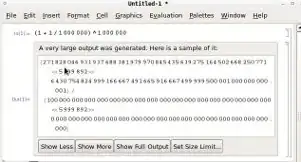Try
N[1 + 1/100000000000000, 2000]^100000000000000
which makes Mma do the computation with floating point numbers (but using 2000 exact digits, waaaaay more that your calculator!) In my computer,
In[41]:= Timing[N[1 + 1/100000000000000, 2000]^100000000000000]
Out[41]= {0.001999,
2.71828182845903164395114517625107361345759538109318401368108700081263
8880450911203511655259489457817904923933478503365902065203002443715271
2825230612837327582882359132201752486932090411441742152459981748434424
6796125955942676709724311384945123182525138185474706841748184641523835
6399319640050121555981826495805200410019220302352025402844917823115708
4890277526840712036588689004850449217720498524694546241483265385120337
3036215908323704165098770345249059641531345794163630084215403881301114
0222776646139077637586730556318554208747513123989912904288599990729397
4105912301684777926066523131379164170616992617301710309080427339172694
8652209704120914116266089477162936814414049552884109177338585344418934
4664761359706737137907335308204793693031274512475102742160130609557028
0606249997104370287581131479088448270923696582800846475772654584603126
9574917252623375481387197279590503661010907784866738170370137382154502
5239391867955746777742097465819430570361920416259681558416618161699424
5237267230224583604177051168028000345047412788448526660107314695031108
5918243291907671190858585383905903649083888525646705126721235172922992
7474539583108858881111281802649615453982269311194004892438663488977893
2481678450112257387961011092938028584251024526367562391996230685117325
0436239706780584781622006285082275199325910403142256578320132681839729
1241283875634170613592405031777334496908146321259758762276254422018659
2501711558155518458153097538288499261588998555672920722850605105301158
3203321297849315979775985916474141976627081937753054953188751346134290
6581791976723248211158139510858187401773833843382750617470712252506403
3501718283248275223376526908879174360214195321187111170739858908536480
0084276450965142494861141929264441784847261049017482036450996057648280
0994695573343998546256052750841029336112669690421548936514156835398676
3390097789579643086512481978170502348966487726085752931492687574582562
2555386293362518511636564659786083245494967887013590756572099854766124
625831647757374695456737571}
takes 0.002 seconds.

ebutton ... – Anthony Mills Sep 21 '10 at 16:51